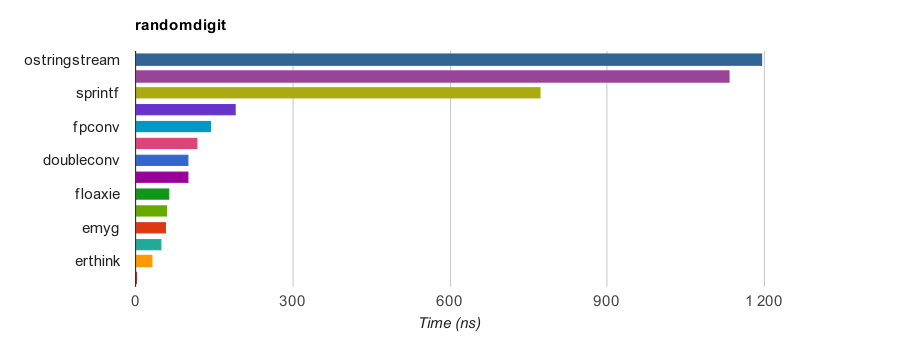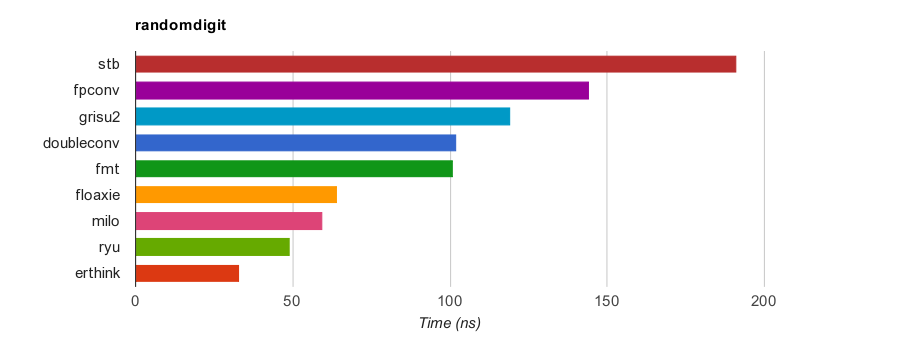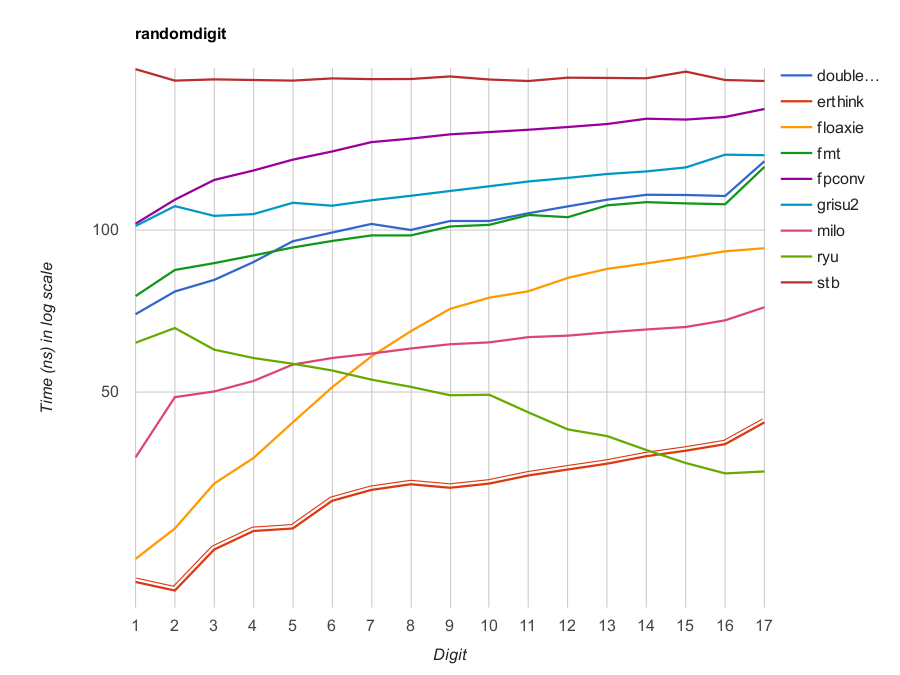dtoa Benchmark
Copyright(c) 2019-2020 Leonid Yuriev leo@yuriev.ru, Copyright(c) 2014 Milo Yip miloyip@gmail.com
Preamble
This fork of the benchmark was created to demonstrate the performance superiority of my new dtoa() implementation over others.
Ryū algorithm by Ulf Adams known to fastest in much cases, especially for short string representations. However, I would like to draw attention to my own speed-competing but more compact implementation.
Briefly, about this double-to-string implementation:
-
It is fastest Grisu-based, but not exactly the Grisu3 nor Grisu2;
-
Compared to Ryū this implementation significantly less in code size and spends less clock cycles per digit, but may slightly inferior in a whole on a 16-17 digit values.
-
Output string representation always roundtrip convertible to the original value, i.e.
strtod()for character string result will return the exactly original value. -
Generated string representation is shortest for more than
99.963%of IEEE-754 double values, i.e. one extra digit for less that0.037%values. Moreover, for less than0.06%of double values, the last digit differs from an ideal nearest by±1. -
For now produces only a raw ASCII representation, e.g.
-22250738585072014e-324without dot and'\0'at the end;
Now I would like to get feedback, assess how much this is in demand and collect suggestions for further improvements. For instance, I think that it is reasonable to implement conversion with a specified precision (i.e., with a specified number of digits), but not provide a printf-like interface. For more into see issue#1.
Any suggestions are welcome!
Introduction
This benchmark evaluates the performance of conversion from double precision IEEE-754 floating point (double) to ASCII string. The function prototype is:
void dtoa(double value, char* buffer);
The character string result must be convertible to the original value exactly via some correct implementation of strtod(), i.e. roundtrip convertible.
Note that dtoa() is not a standard function in C and C++.
Procedure
Firstly the program verifies the correctness of implementations.
Then, RandomDigit case for benchmark is carried out:
-
Generates 2000 random
doublevalues, filtered out+/-infandnan. Then convert them to limited precision (1 to 17 decimal digits in significand). -
Convert these generated numbers into ASCII.
-
Each digit group is run for 10000 times. The minimum time duration is measured for 42 trials.
Build and Run
- Obtain cmake
- Configure build system by running
cmake .and build benchmark by runningcmake --build . - On success, run the
dtoa-benchmarkexecutable is generated atdtoa-benchmark/or corresponding subdirectory (e.gReleaseon Windows). - The results in CSV format will be written to
dtoa-benchmark/results. - Run GNU
makeindtoa-benchmark/resultsto generate results in HTML.
Results
The following are results measured by RandomDigit testcase on a PC (Core i7-7820HQ CPU @ 2.90GHz), where dtoa() is compiled by GNU C++ 9.2.1 for x86-64 Linux. The speedup is based on sprintf’s Sum values.
| Function | Min ns | RMS ns | Max ns | Sum ns | Speedup |
|---|---|---|---|---|---|
| null | 1.2 | 1.200 | 1.2 | 20.4 | N/A |
| erthink | 21.4 | 33.381 | 43.9 | 558.1 | ×23.5 |
| ryu | 35.3 | 50.011 | 65.7 | 835.4 | ×15.7 |
| emyg | 38.1 | 58.310 | 69.7 | 983.2 | ×13.3 |
| milo | 37.8 | 59.819 | 71.8 | 1007.7 | ×13.0 |
| floaxie | 24.5 | 68.028 | 92.4 | 1089.8 | ×12.0 |
| fmt | 75.3 | 101.532 | 130.8 | 1712.2 | ×7.7 |
| doubleconv | 69.7 | 103.070 | 134.0 | 1731.4 | ×7.6 |
| grisu2 | 101.6 | 119.538 | 137.8 | 2024.3 | ×6.5 |
| fpconv | 102.6 | 145.437 | 167.5 | 2454.2 | ×5.3 |
| stb | 188.8 | 191.082 | 198.6 | 3248.1 | ×4.0 |
| sprintf | 700.1 | 772.833 | 827.7 | 13119.8 | ×1.0 |
| ostrstream | 1058.4 | 1133.081 | 1187.4 | 19250.5 | ×0.7 |
| ostringstream | 1110.9 | 1196.817 | 1267.8 | 20327.0 | ×0.6 |
All implementations

Fastest competitors


Implementations in descending order of speed
| Function | Description |
|---|---|
| erthink | Leonid Yuriev’s Grisu-based C++ implementation. |
| ryu | Ulf Adams’s Ryū algorithm. |
| emyg | C version of Milo Yip’s Grisu2 implementation by Doug Currie. |
| milo | Milo Yip’s Grisu2 C++ implementation for RapidJSON. |
| floaxie | Alexey Chernov’s Grisu2 implementation. |
| fmt | Victor Zverovich’s Grisu2 implementation for {fmt} C++ library. |
| doubleconv | C++ implementation extracted from Google’s V8 JavaScript Engine with EcmaScriptConverter().ToShortest() (based on Grisu3, fall back to slower bignum algorithm when Grisu3 failed to produce shortest implementation). |
| grisu2 | Florian Loitsch’s Grisu2 C implementation [1]. |
| fpconv | Andreas Samoljuk’s Grisu2 C implementation. |
| stb | Jeff Roberts’s & Sean Barrett’s snprintf() implementation. |
| sprintf | sprintf() in C standard library with "%.17g" format. |
| ostringstream | traditional std::ostringstream in C++ standard library with setprecision(17). |
| ostrstream | traditional std::ostrstream in C++ standard library with setprecision(17). |
|
|
David M. Gay’s dtoa() C implementation. Disabled because of invalid results and/or SIGSEGV. |
FAQ
-
How to add an implementation?
You may clone an existing implementation file, then modify it and add to
CMakeLists.txt. Re-runcmaketo re-configure and re-build benchmark. Note that it will automatically register to the benchmark by macroREGISTER_TEST(name).Making pull request of new implementations is welcome.
-
Why not converting
doubletostd::string?It may introduce heap allocation, which is a big overhead. User can easily wrap these low-level functions to return
std::string, if needed. -
Why fast
dtoa()functions is needed?They are a very common operations in writing data in text format. The standard way of
sprintf(),std::stringstream, often provides poor performance. The author of this benchmark would optimize thesprintfimplementation in RapidJSON.
References
[1] Loitsch, Florian. “Printing floating-point numbers quickly and accurately with integers.” ACM Sigplan Notices 45.6 (2010): 233-243.
